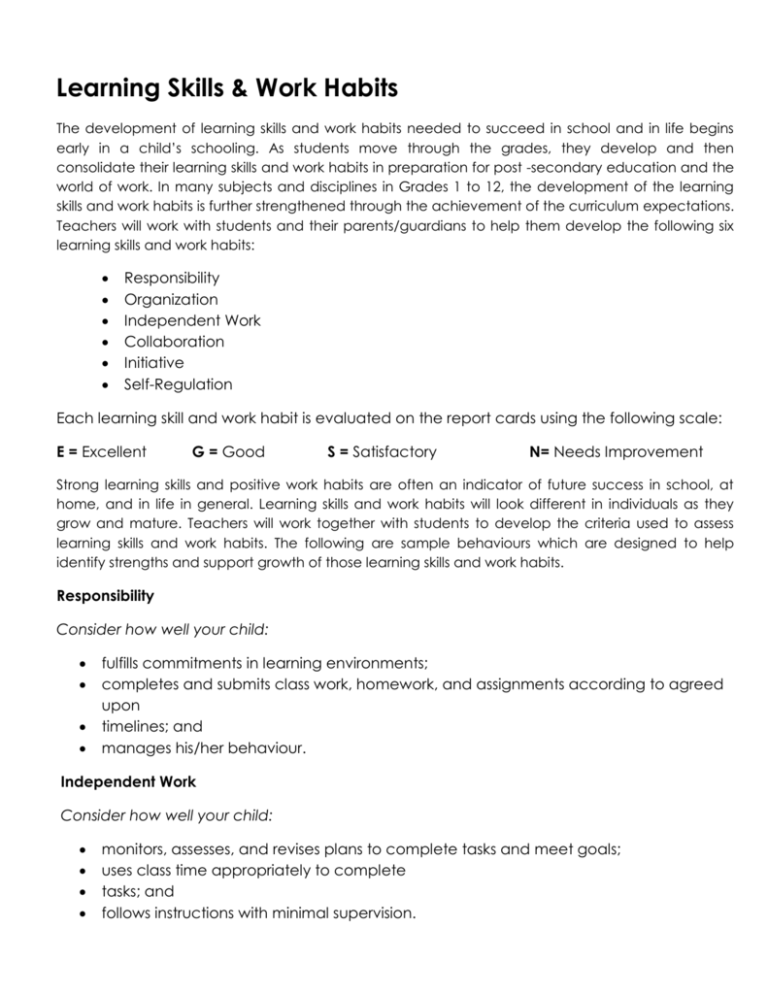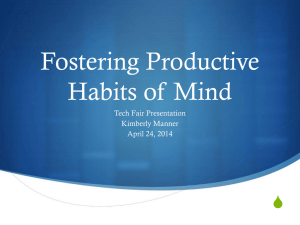Learning Skills and Work Habits
advertisement

Learning Skills & Work Habits The development of learning skills and work habits needed to succeed in school and in life begins early in a child’s schooling. As students move through the grades, they develop and then consolidate their learning skills and work habits in preparation for post -secondary education and the world of work. In many subjects and disciplines in Grades 1 to 12, the development of the learning skills and work habits is further strengthened through the achievement of the curriculum expectations. Teachers will work with students and their parents/guardians to help them develop the following six learning skills and work habits: Responsibility Organization Independent Work Collaboration Initiative Self-Regulation Each learning skill and work habit is evaluated on the report cards using the following scale: E = Excellent G = Good S = Satisfactory N= Needs Improvement Strong learning skills and positive work habits are often an indicator of future success in school, at home, and in life in general. Learning skills and work habits will look different in individuals as they grow and mature. Teachers will work together with students to develop the criteria used to assess learning skills and work habits. The following are sample behaviours which are designed to help identify strengths and support growth of those learning skills and work habits. Responsibility Consider how well your child: fulfills commitments in learning environments; completes and submits class work, homework, and assignments according to agreed upon timelines; and manages his/her behaviour. Independent Work Consider how well your child: monitors, assesses, and revises plans to complete tasks and meet goals; uses class time appropriately to complete tasks; and follows instructions with minimal supervision. Collaboration Consider how well your child: accepts various roles and an equitable share of the work within a group; responds positively to the ideas, opinions, values, and traditions of others; builds healthy peer relationships; works with others to resolves conflicts and builds consensus to achieve group goals; and shares information, resources, and expertise to solve problems and make decisions. New Reporting Policies for Ontario A Guide for Elementary and Secondary Students and Their Parents/Guardians Assessment, Evaluation & Reporting for Parents and Guardians Organization Consider how well your child: creates and follows a plan to complete work and tasks; establishes priorities and manages time to achieve goals; and gathers, evaluates and uses information, technology and resources to complete tasks. Initiative Consider how well your child: acts upon new ideas and opportunities for learning; demonstrates a willingness to take risks; demonstrates curiosity and interest in learning; approaches new tasks with a positive attitude; and recognizes and advocates appropriately for the rights of self and others. Self-Regulation Consider how well your child: sets his/her individual goals and monitors progress towards achieving them; seeks assistance when needed; assesses and reflects critically on her/his strengths, needs and interests; identifies learning opportunities, choices, and strategies to meet personal needs and achieve goals; and perseveres when facing challenges. Learning Skills & Work Habits You and your child are important partners in the learning and assessment process. Teachers will help students to: understand what they are expected to know and be able to do in order to successfully demonstrate these learning skills and work habits; set goals for growth; and build on strengths, use learning preferences, and focus on areas of need to achieve success. Teachers, students and parents/guardians will work together to set goals for developing all of the learning skills and work habits.




